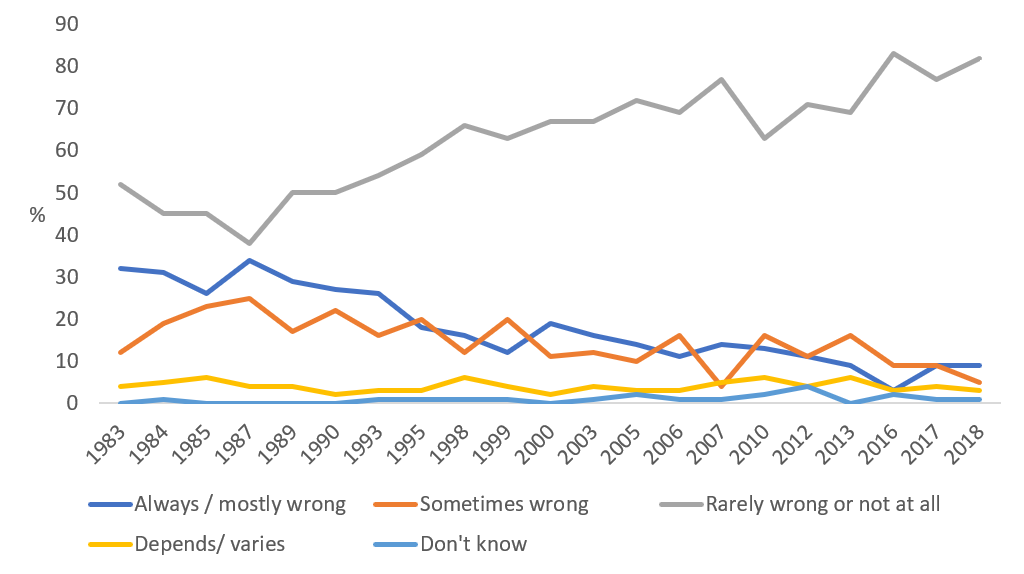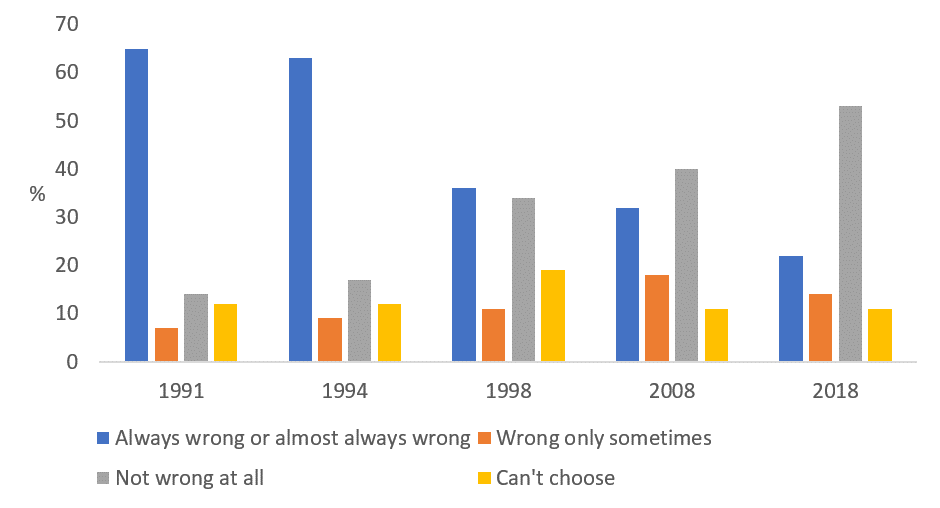This post examines recurrent survey data which shed light on the views of Catholics in Britain on key social issues. The data reported here involve analysis of the British Social Attitudes surveys (BSA) and the European Values Study (EVS). What can the data from these surveys tell us about Catholics’ attitudes on the issues of same sex relations, abortion and euthanasia?
Figure 1 shows how Catholics have viewed abortion, homosexuality and euthanasia, when asked to rate how justified (or not) they think each one is using a scale ranging from 1 (can never to be justified) to 10 (always justified). For Catholics in Britain, average scores for each issue are shown for the five waves of the EVS undertaken in Britain between 1981 and 2017. Over recent decades, Catholics’ views of whether abortion, homosexuality or euthanasia are justified have all shifted, and in a more liberal direction. In 1981, the mean score for Catholics was 2.6, which rose to 5.1 in 2017. For views of homosexuality, the average score had increased from 3.6 in 1981 to 7.1 in 2017. A similar liberalisation of views of euthanasia also occurred, with the average scores being 3.4 in 1981 and 6.1 in 2017.

The BSA surveys have featured relevant questions gauging attitudes on these three topics. Figure 2 charts Catholics’ views on same sex relations from 1983 through to 2018, gauging whether they thought they are wrong or not. Figure 2 shows the proportions answering that same sex relations are always or mostly wrong (combined), sometimes wrong, rarely wrong or not wrong at all (combined), it depends or varies, or were unsure. Over recent decades, the proportion of Catholics in Britain taking the view that same sex relations are rarely wrong or not wrong at all has increased considerably: 52% held this view in 1983, which it risen to 82% in 2018. While 45% thought that same sex relations were always / mostly wrong or sometimes wrong in 1983, the corresponding proportion in 2018 was 18%.

The BSA surveys have also asked a very similar question (but offering fewer response options) since 1991, as shown in Figure 3. Again, Catholics have shown considerable liberalisation in their views of same-sex relations, based on their changing response to this question. In 1991, 65% thought that they were always or mostly wrong (combining the two response options), which had declined to 22% in 2018. The proportion saying that same sex relations were not wrong at all increased from 14% to 53% over the same period. The proportions taking the view that same sex relations were only sometimes wrong have always been small, albeit somewhat higher in more recent surveys.

The BSA survey data on attitudes towards euthanasia also show increased acceptance amongst Catholics since the early-1980s, as was seen in the EVS surveys. Figure 4 shows the proportions of Catholics who were for or against doctors being be allowed by law to end a patient’s life, if that patient had requested it. In each survey, the proportion in favour clearly outweighed the proportion against. 1983, 58% were in favour; in 2016 it was 68%.

The EVS showed that acceptance of abortion in general had clearly risen over time. The BSA surveys have asked about support for or opposition to abortion in different circumstances. Catholics’ attitudes towards abortion in three sets of circumstances, for the period 1983-2016, are shown in Figure 5. Consistently, there has been much higher approval of an abortion when the woman’s health is seriously endangered by the pregnancy (in the range of 74% to 93%). Over recent decades, support amongst Catholics has registered at lower levels for abortion in the circumstances of a couple deciding they cannot afford to have more children and a woman deciding on her own not to have another child. Both of these questions also show a shift towards increased approval over time.

Figure 6 reports the distribution of responses amongst Catholics for a similar question – asked between 1991 and 2018 – on abortion for the situation where the couple cannot afford more children, offering a wider set of response options. As can be seen, in each survey, amongst Catholics, the (combined) proportion opting for always wrong or mostly wrong has been the most common view over time – lowest in 2018. The (combined) proportion taking the view that an abortion in such circumstances was wrong only sometimes or not wrong at all was highest in 2018.

The survey data examined above show that British Catholics, across recent decades, have generally moved in a liberal direction on key social issues, becoming much more accepting of same sex relations, euthanasia and abortion (both in general and in particular circumstances).